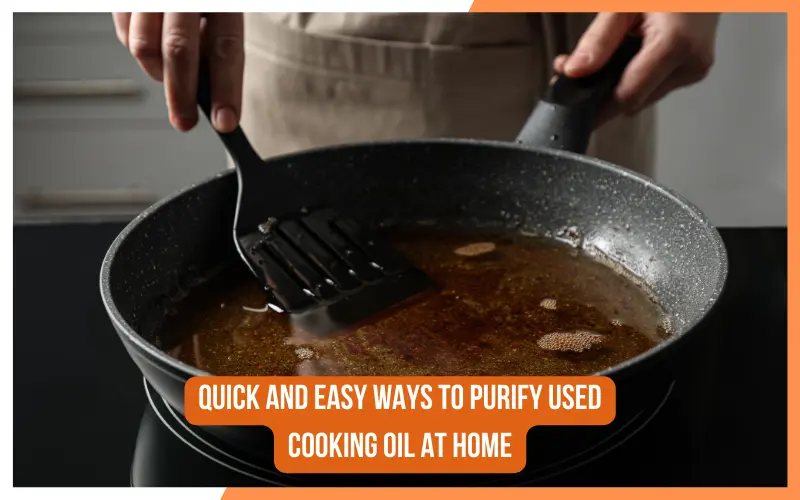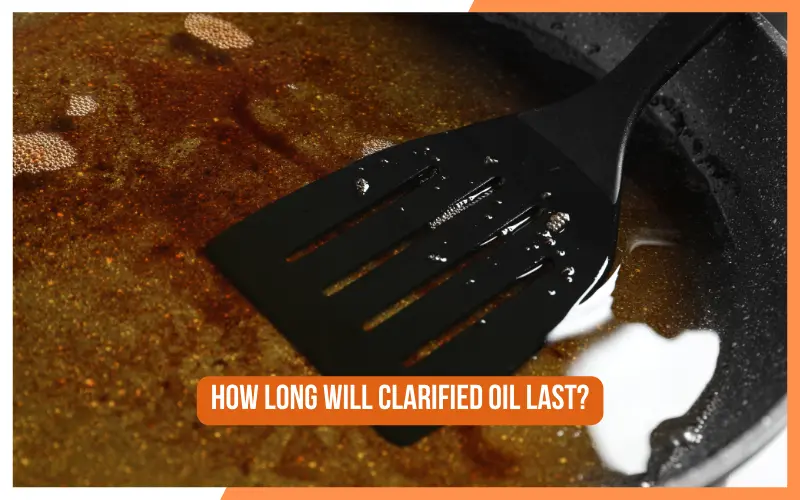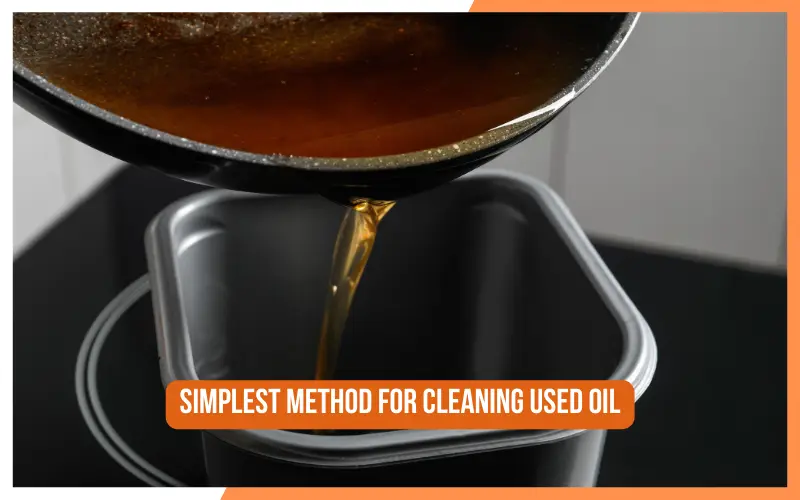Cooking oils are essential for our daily life. They are widely used in various food preparation processes, such as frying, deep-frying, or stir-frying. If the used cooking oil goes bad, it will cause serious health problems. Therefore, how to purify used cooking oils at home is very important.
To remove impurities from used cooking oil, you should add salt. Then heat it until it reaches 180 degrees Celsius (356 Fahrenheit). After that, you should let the mixture cool down naturally.


How Long Will Clarified Oil Last?
Clarifying oil makes salad dressings, sauces, dips, marinades, and spreads. This type of oil is usually sold in small containers, like squeeze bottles. You can use it for frying, baking, sautéing, stir-frying, roasting, grilling, broiling, poaching, deep-frying, and even making vinaigrettes. Clarified oil is often considered healthier because it doesn’t contain trans fats. However, you still want to store it properly.
You can reuse clarified oil up to three times, but each time, you’ll need to let it sit for about 30 minutes before using it again. After that, you can use it for one recipe. Once you’ve used it, you’ll need to throw it away.

Simplest Method for Cleaning Used Oil
If you don’t want to waste money buying new oils every month, here’s how to clean used oil without wasting it.
With a Coffee Filter
Frying oil is one of those things you just don’t want to waste. If you’re lucky enough to have leftover cooking oil, it’s easy to use again. But if you’ve drained off all the oil, what do you do with it? Here are some tips on how to strain out the remaining oil.
With a Cornstarch Slurry
Fried foods are delicious, but sometimes you want to ensure no stray bits of food are stuck in the frying pan. If you’re worried about getting burned while cleaning the pan, try stirring some cornstarch into the oil first.
This method works best when you use high heat for cooking food, like deep frying. You’ll find that the cornstarch dissolves quickly and easily, making it easy to strain out the rest of the food particles.
To do this, pour some cornstarch into a bowl and add enough vegetable oil to cover the bottom of the bowl. Heat the oil over medium-high heat until it reaches 350 degrees Fahrenheit. Add the food you want to fry, and let it cook for 5 minutes.
Then carefully drain off the excess oil, and discard it. Pour the cornstarch mixture into the pan, and continue cooking the food for another 2 to 3 minutes. Once the food is cooked, turn off the stove and allow the food to cool down completely. Remove the food from the pan, and serve.
Gelatin Clarification Works
Oil clarification is an old technique used since ancient times. In modern times, gelatin is added to the oil to bind the impurities together.
Gelatin is a protein derived from animal bones, skin, tendons, ligaments, and connective tissue. It is usually extracted from cowhide, pig hide, sheep hide, horse hooves, and deer antlers.
The process begins with heating the oil to around 150 degrees Fahrenheit. Then, the gelatin is added and stirred continuously until the mixture thickens. Afterward, the oil is cooled down and filtered.
This method works well for most oils but doesn’t work for some kinds of oil, such as castor oil. This is because castor oil contains high levels of ricinoleic acid, which makes it difficult to clarify.
Add In Lemons
Lemon juice is an effective cleaning product. You can use it to clean the car. But you must know how to cut lemons properly. If you don’t, black particles will stick to the surfaces of the lemon after cutting, and the lemon juice will lose its effectiveness.
Store It Away from Light
The best way to store oil is to keep it from light and heat. This includes keeping it away from direct sunlight, where it can become heated and potentially break down. For example, if you are storing it in a garage, make sure there isn’t much direct sunlight coming into the garage.
Also, don’t store it near heating units like stoves or ovens. You want to avoid having the oil come into contact with those things because they can cause the oil to break down even faster.
If you decide to use a cooler location, ensure it is well-ventilated. Oil doesn’t take very good care of itself, so you want to ensure that air flows through the area. If you notice that the oil starts to smell funny, that’s a sign that it needs to be stored somewhere else.
Don’t Keep It Near the Heat
Oil should be kept cold and away from heat sources like stoves and ovens. This keeps the oil fresher for longer. If you store it in the fridge, ensure it stays there. You don’t want to open the door and find that the oil has gone rancid.
Conclusion
In conclusion, if you use oil for frying, heating, baking, etc., you should always clean it properly before using it again. This will prevent bacteria from growing inside the container and potentially causing illness. Here’s how to do it right.

Meet our air fryer recipe expert, Jenny J. Brown. Jenny is a culinary enthusiast with a passion for creating healthy, delicious meals using the latest kitchen appliances. As an experienced home cook and food blogger, Jenny has spent years experimenting with air fryer recipes and perfecting her techniques to create meals that are both nutritious and satisfying.

